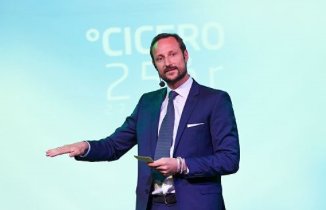 Norway’s foremost institute for interdisciplinary climate research has launched a new initiative pairing scientists with leading investors to better explain climate risk.
Norway’s foremost institute for interdisciplinary climate research has launched a new initiative pairing scientists with leading investors to better explain climate risk.
The Center for International Climate and Environmental Research – Oslo (CICERO) has launched the Climate Finance Initiative, “a meeting place for climate scientists and leading global investors to improve the understanding of climate risk.” Together, the Initiative hopes to “develop tools to incorporate climate risk in long-term investments, tailored to investors’ needs and inspired by the latest climate science.”
“Climate risk and sustainable investment are ever higher on the agenda in many financial environments, but climate change researchers and financial stakeholders do not always speak the same language,” said Kristin Halvorsen, Director and Former Norwegian Minister of Finance. “Our goal is to bridge that gap and jointly develop solutions.”
Much has been made recently of the need to better tailor future investments to account for both climate risks and the future of the fossil fuel industry. In April, the Institutional Investors Group on Climate Change published a report warning utilities of the threat of climate change, while a report from the Sustainable Finance Programme at the University of Oxford’s Smith School of Enterprise and the Environment concluded that the planned expansion of Japan’s fleet of coal-fired generation plants could end up stranding $56 billion in assets.
Earlier this month, Investment Leaders Group published a new report detailing the massive impact that energy and carbon regulations can have on a company’s bottom line. Investors are increasingly looking to renewable energy for future investment opportunities, at the same time as the global campaign to divest from fossil fuel investments continues to ramp up — highlighted most recently by news that the Bill and Melinda Gates Foundation Trust divested itself entirely from any investments in the super-major oil and gas company BP. Another global energy behemoth, Shell, is also looking forward, having just created its New Energies division, which will focus on investing in new energy such as solar and wind.
With climate change increasing the possibility of extreme weather events, and the ever-increasing shift away from fossil-fuel based energy generation, the Climate Finance Initiative aims to work with investors to provide scientific information to influence investment decisions based on climate risk.
“As we seek to expand our evaluation of the risks portfolios face from climate issues, both from a transition and physical perspective, we look forward to continuing to benefit from CICERO’s climate expertise while sharing with them what metrics are most meaningful to investors,” said Ashley Schulten, Head of Climate Solutions at BlackRock, the world’s largest private investor. “We have worked previously with CICERO on our impact reporting efforts in the green bond space and found they were able to interpret our needs as an investor and help us understand and evaluate environmental metrics.”
“With green bonds issued by the World Bank and others, investors can support climate action through a simple fixed income product,” added Heike Reichelt, Head of Investor Relations and New Products at the World Bank. “CICERO’s second opinion was a key part of the green bond model developed for the first World Bank Green Bond together with SEB in 2008, which has helped the market diversify with integrity. We look forward to continuing our collaboration with CICERO to expand the opportunities for investors to support climate finance.”
Already, BlackRock and the World Bank Treasury, in addition to a number of Scandinavia’s biggest financial actors and leading climate financial experts, have signed up to the Initiative’s Advisory Board which will support the Climate Finance Initiative.
“Climate finance is key to meeting the adaptation and mitigation needs of developing countries. Private climate finance flows to developing countries are already quite significant. However, much more is needed,” said Børge Brende, the Norwegian Minister of Foreign Affairs, which is providing start-up money for the initiative. “CICERO Climate Finance will build on and utilize the nexus of climate finance expertise in Norway, expanding on this experience and extending it to international actors and activities.”
(cleantechnica)
